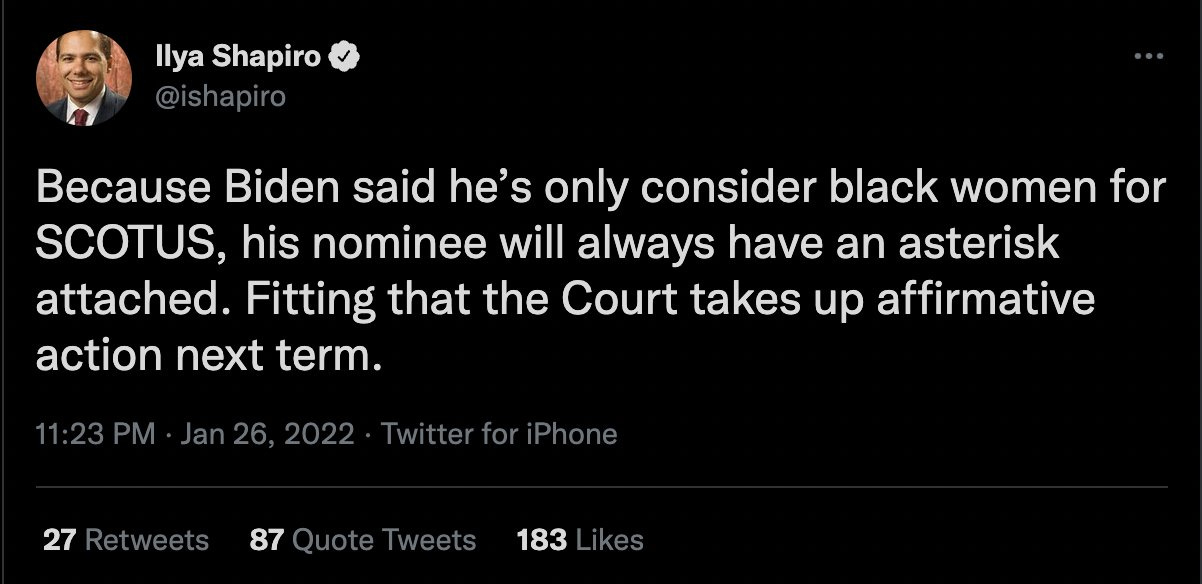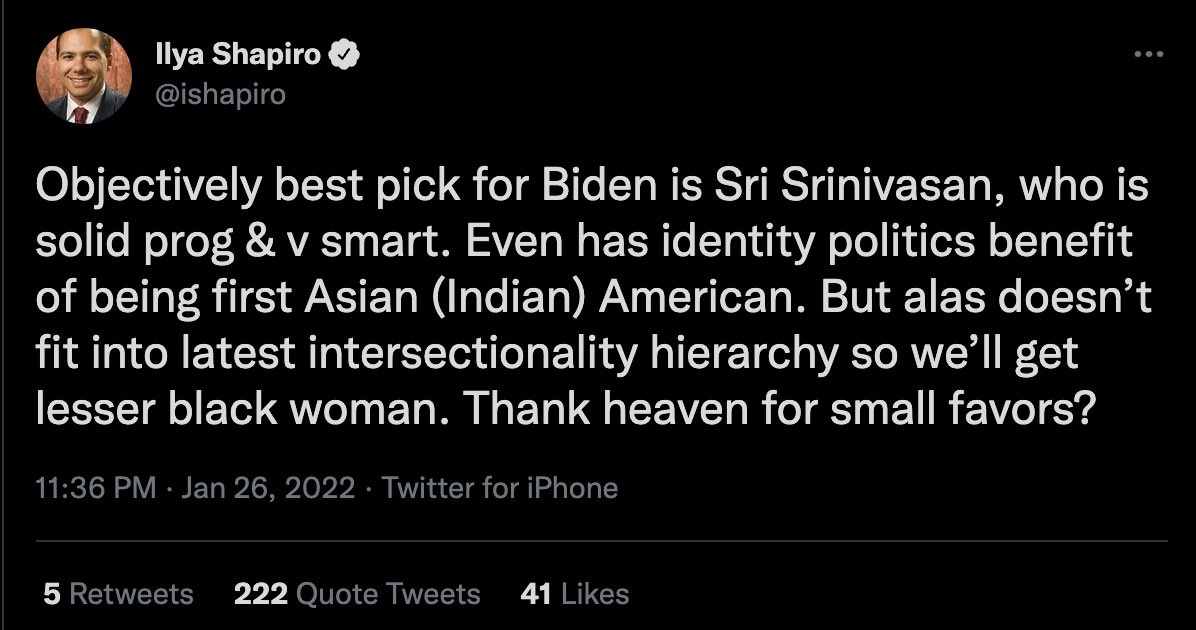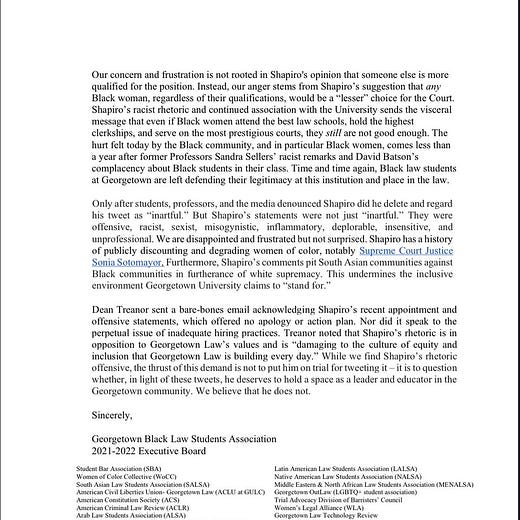Ilya Shapiro and the media-victimhood industrial complex
"Victims of cancel culture" don't even actually need to be "canceled" anymore.
You probably don’t know who Ilya Shapiro is. And that is okay because this post isn’t really about him. He just happens to be a good example of what I want to talk about, so stick with me here…
So back in January, news broke that Supreme Court Justice Stephen Breyer’s retirement announcement was imminent. As is always the case, people who spend way too much time on the internet rushed to Twitter to share their thoughts — some good, some bad, and… well… some… Ilya Shapiro.
Shapiro is a conservative commentator, lawyer, and former Vice President of the libertarian Cato Institute. His reaction to Breyer’s retirement made some waves.
“Because Biden said he’[d] only consider black women for SCOTUS, his nominee will always have an asterisk attached. Fitting that the Court takes up affirmative action next term,” Shapiro tweeted. “Objectively best pick for Biden is Sri Srinivasan, who is solid prog[ressive] & v[ery] smart. Even has identity politics benefit of being first Asian (Indian) American. But alas doesn’t fit into latest intersectionality hierarchy so we’ll get lesser black woman. Thank heaven for small favors? “


During his run for president, Joe Biden committed to nominating a Black woman to the Supreme Court. There had never been a Black woman on the Court. Conservative media had been periodically using that promise as evidence that Biden was “excluding” other potential Supreme Court nominees because they weren’t Black women. The argument was that this wasn’t fair, that this was racist (against white people?), that this was sexist (against men?), and that Biden wouldn’t be choosing based on merit, yadda yadda, etc.
Contrary to what Shapiro says, there is not an “objectively best pick” in this case. When he says “objectively,” here, he’s quite literally (and yes, I mean “literally” as in literally) using it to describe his subjective view.
This ignores the fact that at any given time, thousands of people would be just as “good” as any other candidate to be nominated to SCOTUS. There are, were, and will continue to be people of all backgrounds who are all just as qualified as each other to be one of just nine members of the Court. Biden’s pledge to nominate a Black woman didn’t sacrifice quality in the name of representation, and the idea that there’s one true “most qualified” person for pretty much any job is pretty silly, especially when it comes to extremely selective institutions like the Supreme Court.
Shapiro’s point crumbles. Saying that Biden’s pick would be a “lesser Black woman?” Saying that this means her nomination would come with an “asterisk?” That’s just racism. It’s clear-cut. The only thing he knew about the pick was that it would be a Black woman; therefore, it was “lesser” in his mind.
He got a lot of criticism on Twitter over it, and the dean of Georgetown University Law Center, where Shapiro was just about to start working as a senior lecturer and as the executive director of the school’s Center for the Constitution, added to the mix by calling the tweets “appalling” and “at odds with everything we stand for at Georgetown Law and are damaging to the culture of equity and inclusion that Georgetown Law is building every day.”
The dean’s point is fair. It is appalling that someone who would soon be wielding a fair amount of power within the school would tweet that Biden’s upcoming pick (which would end up being Ketanji Brown-Jackson) should be viewed with an “asterisk” on account of her race and gender, and that picking a Black woman would be a “lesser” pick. If you were a Black woman at Georgetown’s law school and this is the kind of stuff the head of the school’s Center for the Constitution was tweeting, could you feel confident that he wasn’t biased against you? It was obviously something the dean needed to condemn because it was, as he put it, “appalling.”
The school put Shapiro on administrative leave as it conducted an investigation. And while I know that we’ve gotten to this point where any time a school investigates a professor for misconduct or the potential creation of a hostile learning environment, the right howl about “cancel culture,” there’s nothing wrong with doing some sort of investigation. It’s a way to hear from people who have strong feelings one way or another on a topic. In this case, the Georgetown Black Law Students Association had called for Shapiro’s firing.
While awaiting the results of this investigation, Shapiro floated the baseless claim that protests outside of Supreme Court justices’ homes had caused Justice Samuel Alito and his family to flee to an unknown location. A whole bunch of media outlets decided to cover this
Shapiro just made it up… er, I mean, couldn’t remember where he heard it. Maybe he saw it on Twitter? Who knows!? What a clown.
Anyway, so Georgetown finishes up its investigation and clears Shapiro of violating their rules. Story over, right? Wrong.
On June 2, the right-wing Wall Street Journal gave him space in its right-wing opinion section to talk about his “cancel culture nightmare” being over. Okay, fine, whatever. This is all very stupid.
But then four days later, he put out another piece, again in WSJ, announcing that he resigned. “The university didn’t fire me, but it yielded to the progressive mob, abandoned free speech, and created a hostile environment,” reads the sub-headline.
Keep reading with a 7-day free trial
Subscribe to The Present Age to keep reading this post and get 7 days of free access to the full post archives.








